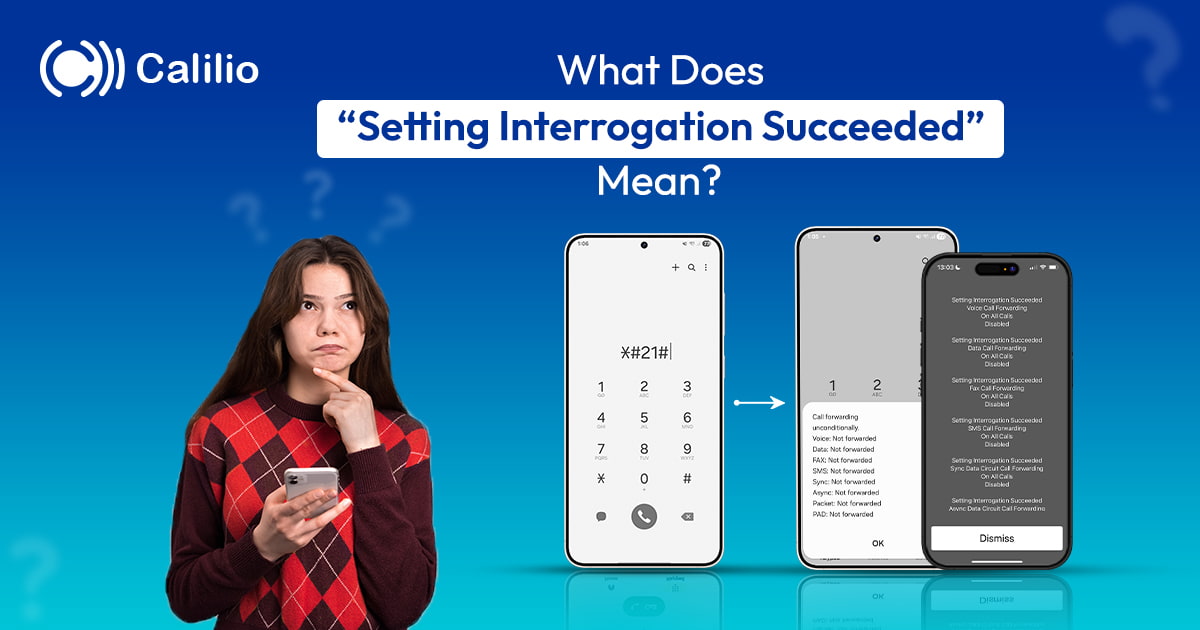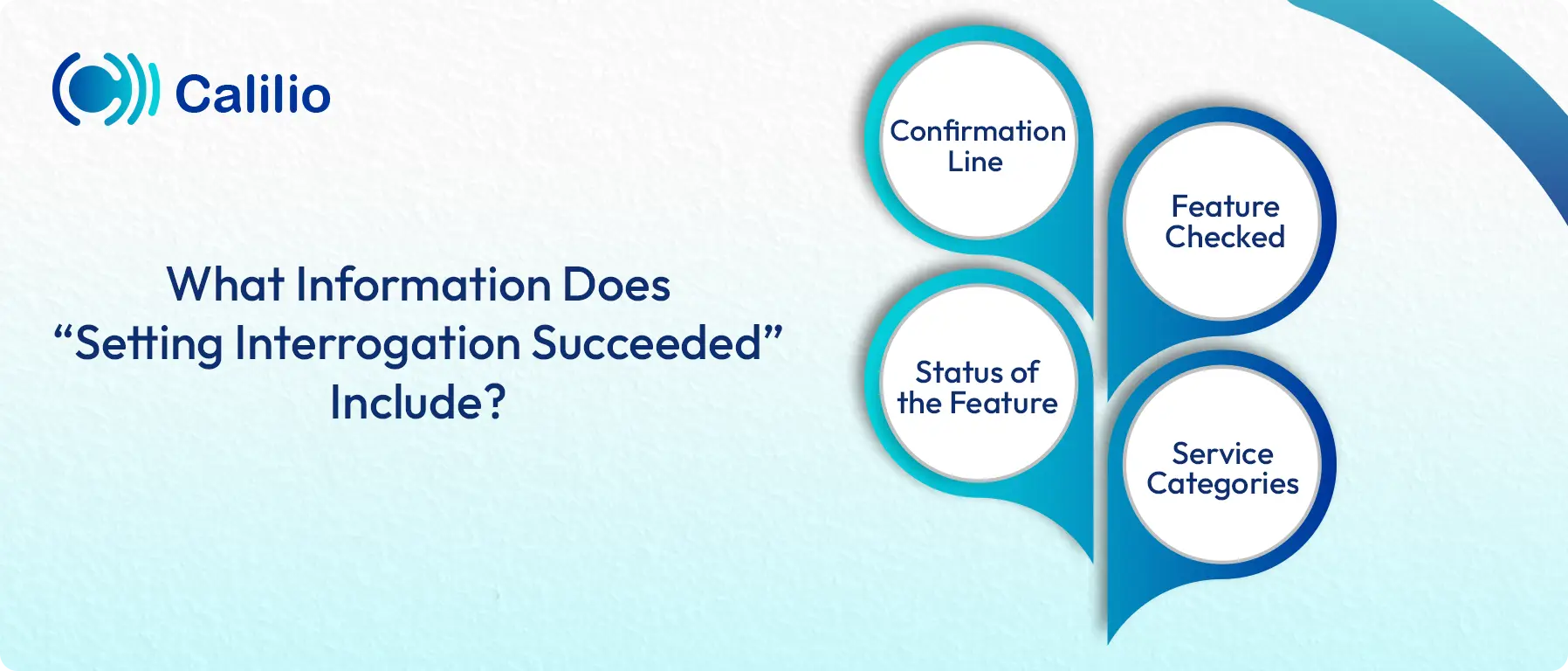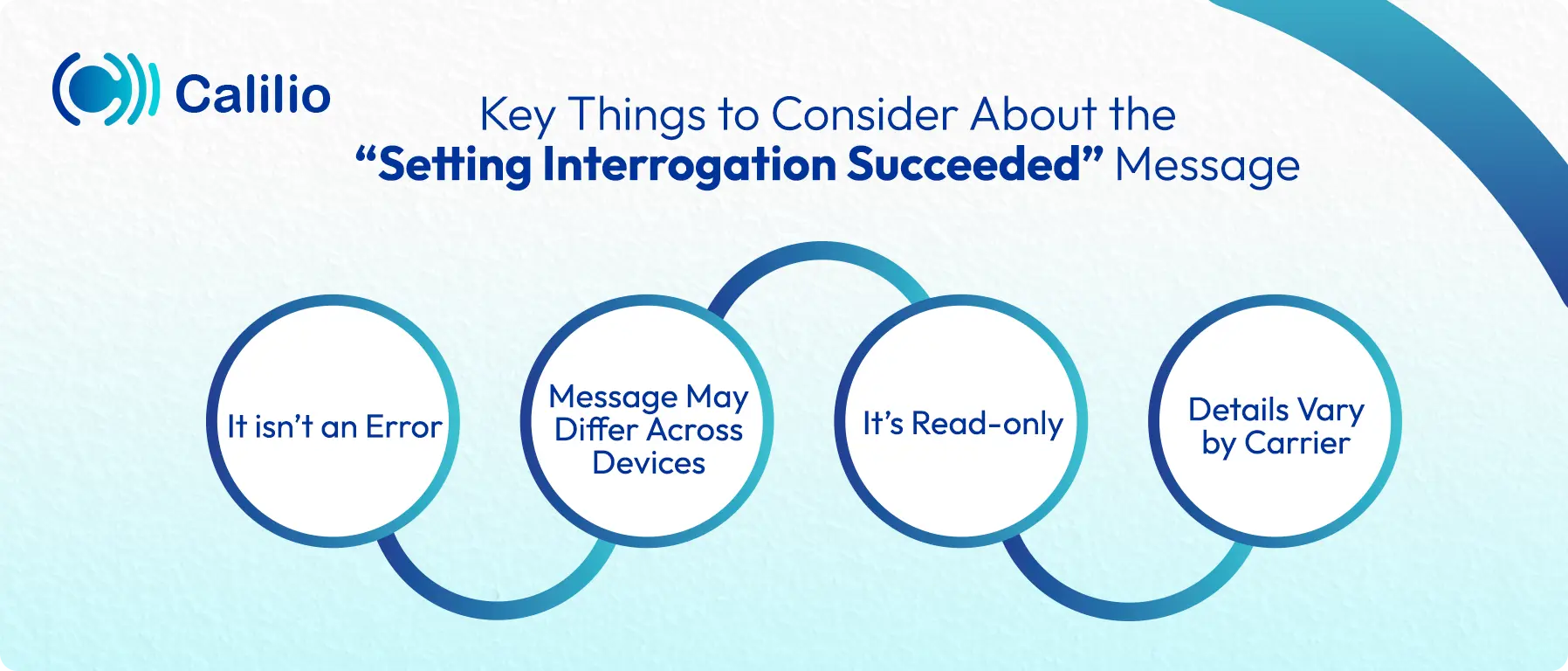What Does the “Setting Interrogation Succeeded” Message Mean?

Summarize this blog with:
If you’ve ever dialed a code like *#21# or *#67# and saw the message “Setting Interrogation Succeeded” pop up on your screen, you’re not alone. The phrase sounds highly technical, and to make things trickier, the way it appears isn’t always the same on iPhone and Android.
Don’t worry! It’s simply your phone showing the reply it gets from your carrier’s network. The message shows the status of the feature you’re checking, such as call forwarding, call waiting, or caller ID.
In this guide, we’ll break down what the “Setting Interrogation Succeeded” message really means, why you see it, what information it shows, and why the experience differs across devices.
Highlights:
“Setting Interrogation Succeeded” means your request to check a feature’s status reached the network and received a valid response.
The reply includes the status of the feature you checked, such as call forwarding, call waiting, call barring, or caller ID.
On iPhones, the message often includes the feature status and service types, like Voice, SMS, Fax, or Data.
“Setting Interrogation Failed” appears if the code isn’t supported by your carrier, the feature isn’t part of your plan, your signal is weak, or the code was dialed incorrectly.
What Does Setting Interrogation Succeeded Mean?
"Setting Interrogation Succeeded" means that your phone has successfully communicated with the cellular network and confirmed that your current settings are correct. This message often appears after you dial special "interrogation codes" (also known as USSD or MMI codes) on your phone's keypad. These codes are not for regular calls but are used to check or change specific network settings.
The message not only indicates that your request reached the network successfully but also confirms that the network has processed it and provided a detailed status update for the feature you queried.
Examples of “Setting Interrogation Succeeded” Message
When you run an interrogation code (like *#21# for call forwarding), your phone displays one of these responses:
- If Call Forwarding is Enabled:
Setting Interrogation Succeeded, Voice Call Forwarding
Forward to: +1XXXXXXXXXX - If Call Forwarding is Disabled:
Setting Interrogation Succeeded, Voice Call Forwarding, Disabled - If the Request Fails:
Setting Interrogation Failed, Network or Connection Error
This applies to other settings as well, such as call barring, call waiting and caller ID, where you’ll see whether the option is turned on or off.
Common USSD Interrogation Codes for Checking Call Settings
Settings USSD Code PurposeCall Forwarding *#21# To check unconditional call forwarding *#61# To check “no answer” forwarding *#62# To check “unreachable” forwarding *#67# To check “busy” forwarding Call Waiting *#43# To check call waiting Call Barring *#33# Outgoing call barring *#35# Incoming call barring Caller ID (CLIR/ CLIP) *#30# To check if your phone shows the caller’s number (CLIP) *#31# To check if your number is hidden when making calls (CLIR)
What Information Does “Setting Interrogation Succeeded” Include?
The “Setting Interrogation Succeeded” message shows which feature you checked, confirms whether it is enabled or disabled, and provides details such as the forwarding number if applicable. On iPhones, the report is often more detailed, listing categories like Voice, Data, Fax, and SMS separately.

- Confirmation Line: The message begins with “Setting interrogation succeeded,” confirming that the query to the network worked.
- Feature Checked: It shows which service you requested information about, such as call forwarding or caller ID.
- Status of the Feature: The report indicates whether the feature is enabled or disabled. In case of call forwarding, it also shows if the phone is set for unconditional forwarding or conditional forwarding.
- Service Categories: On iPhones, the message often lists separate results for Voice, Data, Fax, and SMS, showing the status of each one.
Why You Might See “Setting Interrogation Failed” Instead?
Sometimes you may see a “Setting Interrogation Failed” message if you enter the wrong code, use a feature your carrier does not support, or face temporary network issues. In some cases, device compatibility can also cause the request to fail, especially on older or customized Android models.
- Carrier Limitations: Not every mobile network supports all interrogation codes. If your carrier does not provide the feature you are checking, the request will fail.
- Weak or No Signal: A weak signal, temporary outage, or connectivity problem can prevent the request from reaching the network.
- Typing Error: If you dial a code that does not apply to your network or feature, the request will fail.
- Device Incompatibility: Some older devices or customized Android versions may not support all interrogation functions, leading to failure messages.
How Does the Message Appear on iPhone & Android?
On iPhones, interrogation codes behave consistently because Apple uses the same phone app and interface across all devices. When you dial a code, the network’s response is always shown in a pop-up message, often with the text “Setting Interrogation Succeeded.” This uniform design makes the experience the same no matter which carrier you use.
However, on Android, the request may go through, but most Android phones don’t show the message. Because manufacturers use different dialer apps, some phones display the full message, others only show a short status like “Call Forwarding has been enabled,” and some show nothing at all, just the ‘Enabled’.
In short, you see the message reliably on iPhones because the system is standardized, while on Android, it depends on both the phone maker and the carrier’s implementation.
Key Things to Consider About the “Setting Interrogation Succeeded” Message
When the interrogation message appears, keep in mind that it only shows the current status of a feature; it does not allow you to turn anything on or off. To receive it successfully, you need a proper network signal and the correct USSD (Unstructured Supplementary Service Data) code.

- It isn’t an Error: The message only confirms the network check was successful. It does not indicate any malfunction.
- Message May Differ Across Devices: iPhones usually show more detailed results, while Android devices may return simpler responses.
- It’s Read-only: Interrogation codes only show you the current status of a feature. They don’t turn anything on or off. Also, you can’t enable or disable the features from here.
- Details Vary by Carrier: Some carriers return detailed information, such as the exact number of calls forwarded, while others may only confirm whether a feature is enabled or disabled.
Conclusion
The “Setting Interrogation Succeeded” message is just a confirmation that the network has replied to your request. Whether it shows call forwarding details, call waiting status, or caller ID information, the message is simply the network’s report of how that feature is currently set.
iPhones usually show more detailed results, while Android often displays shorter or no messages at all. No matter how it looks, the purpose is to keep you informed about your settings.
Calilio Introduces Affiliate Program
Earn 30% lifetime commission on every paid referral.
Turn your audience, network, or customers into a recurring revenue stream.

30% recurring commission on every paid referral

Lifetime earnings for as long as the customer stays subscribed

Unique referral link with real-time tracking

Perfect for agencies, consultants, creators, and SaaS partners

Frequently Asked Questions
What does “setting interrogation succeeded disabled” mean?
“Setting Interrogation Succeeded Disabled” means your phone successfully checked the network, and the feature (such as call forwarding) exists but is currently turned off.
What does it mean when voice call forwarding is enabled?
Are interrogation codes the same for all carriers and phones (iPhone vs. Android)?

Still have questions?
Can’t find the answer you’re looking for? Please chat with our friendly team.
Stay in the loop
Get the latest call insights, trends, and updates delivered straight to your inbox.
By subscribing, you agree to receive updates from Calilio.
You can unsubscribe anytime.